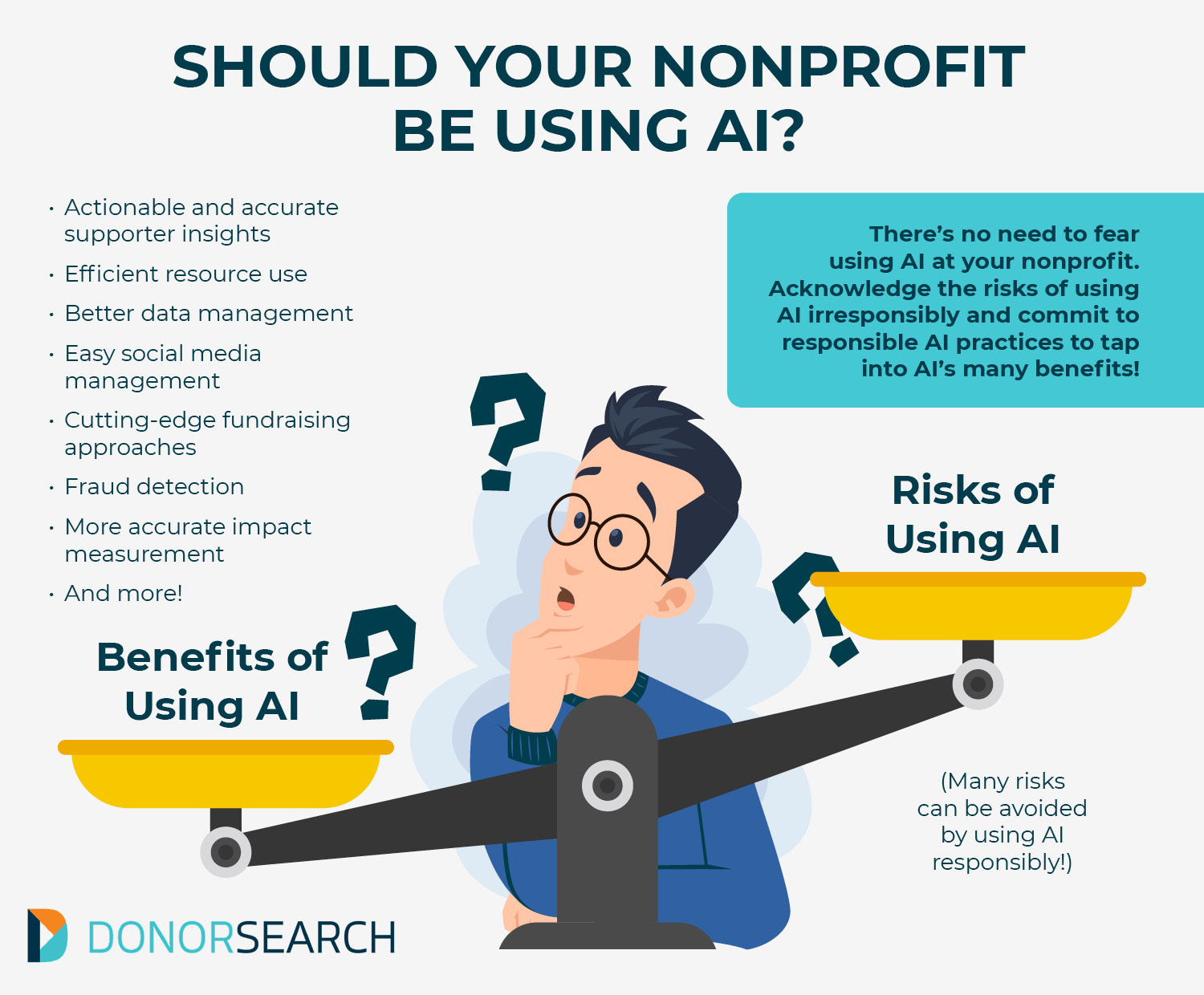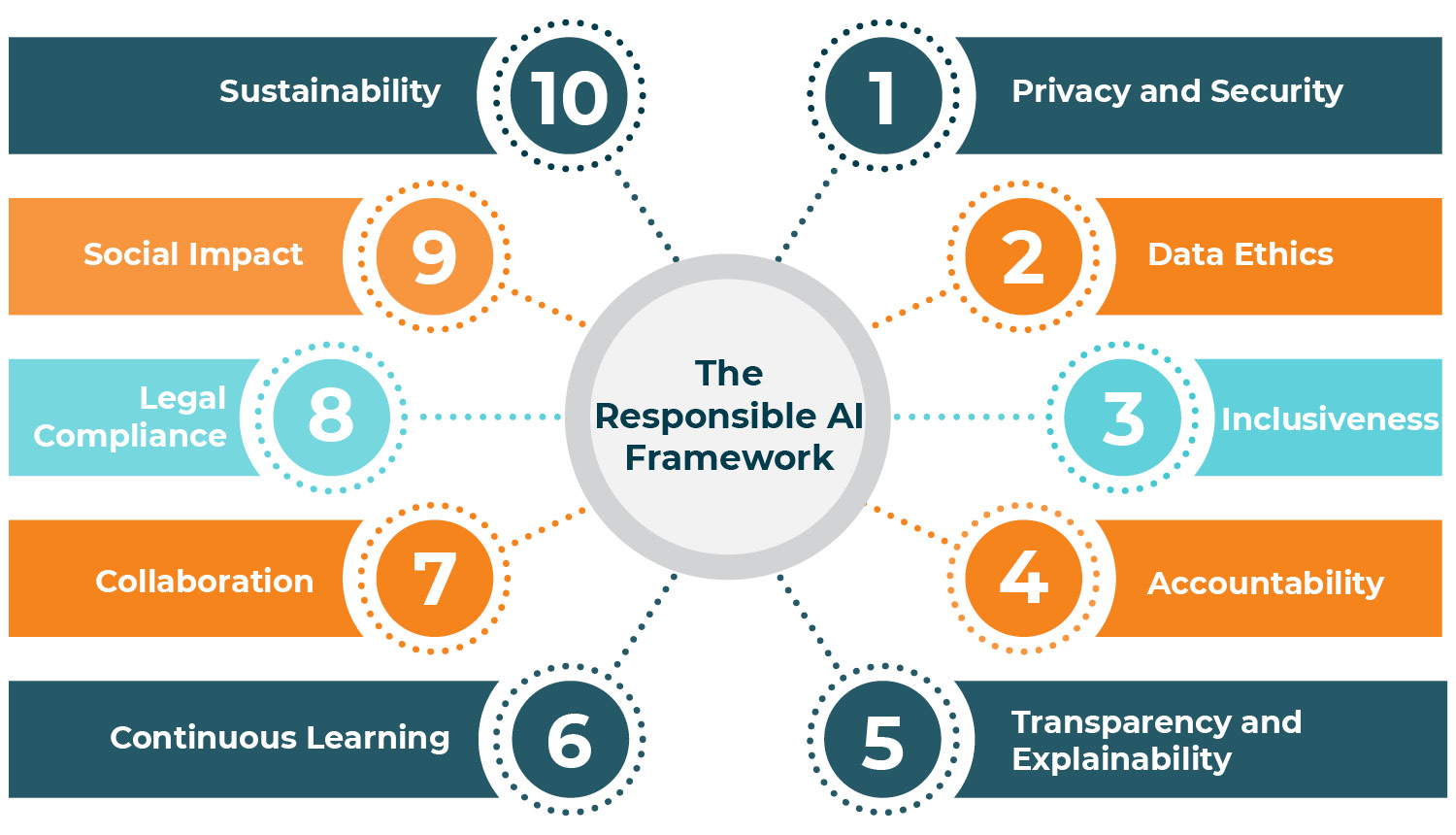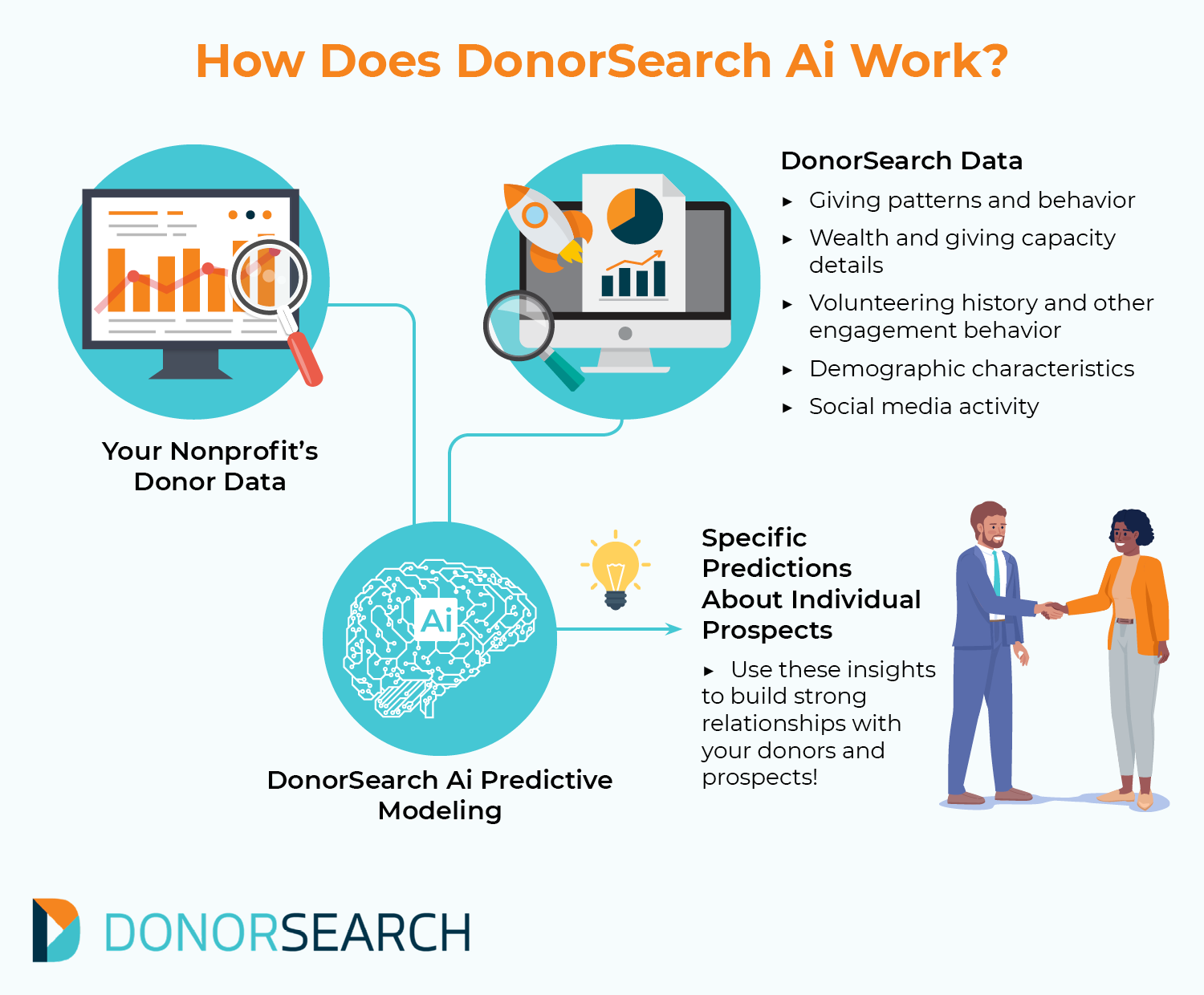
Responsible AI: How DonorSearch Is Shaping Nonprofit Tech
From chatbots and prospecting tools to content generation resources, marketing analytics platforms, and more, there’s a wealth of artificial intelligence (AI) tools available for nonprofits. And there’s no doubt that these tools have the power to help your nonprofit streamline internal operations, engage supporters, and ultimately increase the positive impact you’re having on your community.
Despite its usefulness, however, AI is far from perfect. Improper use can open up your organization to risk, raise ethical concerns, and diminish trust in the nonprofit sector.
If you’re concerned but still want to get the most out of this revolutionary technology, you’re not alone. Pew Research Center found that nearly half of U.S. adults are both concerned and excited about the increased use of AI in daily life.
All nonprofits should commit to understanding, promoting, and using AI responsibly. Education is the first step. In this guide, we’ll introduce you to the world of responsible AI and help you learn how to use AI tools in a way that promotes fairness, transparency, and trust. Specifically, we’ll cover:
- Responsible AI: An Overview
- The Responsible AI Framework
- Best Practices for Using AI Responsibly in Your Nonprofit
- DonorSearch Ai Spotlight: DonorSearch’s Top-Tier AI Tool
DonorSearch is a leader in the nonprofit AI space, and with our own nonprofit prospecting and screening tool, DonorSearch Ai, we’re championing the use of responsible AI for fundraising everywhere. Join us in our efforts to embrace responsible AI transformation and ensure nonprofits are getting the most out of their AI tools while protecting their teams and communities.

Responsible AI: An Overview
Responsible AI is the practice of adopting and using AI technology in a way that promotes privacy, security, ethics, inclusiveness, accountability, and transparency.
Anyone can commit to using AI responsibly, whether they’re a high school student using ChatGPT to brainstorm ideas for college entrance essays or an entrepreneur leveraging an AI platform to manage their small business’s social media presence.
But for nonprofits, responsible AI is especially important. Nonprofit work is built on a foundation of trust—trust from key stakeholders, donors, and volunteers who expect your organization to follow through on its commitments, act with the highest ethical standards, and have a positive impact on vulnerable communities.
To maintain that trust, you can start your fundraising intelligence strategy by acknowledging the risks of using AI irresponsibly and the benefits you’ll experience from using it in the right ways.
The Risks of Using AI Irresponsibly for Fundraising
Without the best practices and safeguards in place to ensure your organization is using AI to do more good for your beneficiaries and stay accountable to your community of supporters, you may fall victim to AI-related risks that could ultimately decrease trust (and thus philanthropic giving), such as:
- Lack of data privacy and security. AI often requires an organization to provide information about its supporters or beneficiaries, which can raise concerns about how your organization protects and uses sensitive information.
- Perpetuated biases and discrimination. AI technology is developed by humans, and humans have biases and prejudices. The algorithms used or the data an AI tool is provided with can potentially perpetuate harmful biases and discrimination.
- Dependence on technology versus human skill. Relying on AI to make perfect decisions or produce perfect deliverables without human input or editing can be hazardous. Plus, this can leave human workers worrying over their job security.
- Challenges complying with regulations and legal requirements. AI is still evolving, which means the regulatory and legal landscape for it is evolving, too, and can sometimes be difficult to keep up with.
- Unintended consequences. It can be difficult to predict what information or outputs an AI tool is going to provide. For example, the National Eating Disorders Association (NEDA) created a chatbot to support individuals with eating disorders, which backfired when the chatbot started offering harmful advice.
Used irresponsibly, each of these risks holds the potential to lead to a decrease in trust between donors, prospects, and nonprofit organizations. This is the primary reason why DonorSearch has invested its resources to promote the responsible use of AI for fundraising within the Fundraising.AI initiative (more on this below!).
When you first acknowledge these risks, it can be tempting to write off AI as too risky to use. But there are nonprofit-specific AI tools out there (like DonorSearch Ai!) with the highest standards of security, ethics, and transparency.
The Benefits of Using AI Responsibly
AI will continue to become more and more ubiquitous and useful to nonprofit fundraising work. In fact, experts predict an annual growth rate of 37.3% from 2023 to 2030 in the adoption of AI technology. That means AI isn’t going anywhere—and, more importantly, you won’t want to miss out on its benefits, such as:
- Actionable and accurate supporter insights. AI can uncover patterns in your supporter data that help you more effectively engage your supporters, whether you’re seeking major donor prospects, personalizing an invitation to volunteer, or planning an upcoming event.
- Efficient resource use. As a nonprofit professional, you know that the name of the game is making your resources stretch. You can save time, money, and energy by automating menial tasks with AI or using it to make complex tasks easier on human workers.
- Better data management. With AI, you can clean and organize your data, detect security threats, and get the data visualizations you need to make informed decisions.
- Easy social media management. In the world of social media, you need to ensure your content meets your audience’s needs, fits in with current trends, and adheres to each platform’s unique requirements. AI can help you with all of this and give you insights into how your social strategy is working.
- Cutting-edge fundraising approaches. Involving AI in your fundraising work can take your campaigns to the next level, whether you’re encouraging donors to give by asking Alexa to make a donation for them or asking supporters to create Facebook fundraising pages, which algorithms will then promote to their friends.
- Fraud detection. AI tools can detect transactions, donations, or grant distributions that look out of place and also identify fraud-indicative language, helping you keep your resources safe and stay accountable to your stakeholders.
- More accurate impact measurement. AI takes the guesswork out of the impact you’re having on your community, assisting you in identifying the outcomes of and opportunities for improvements in your programs, campaigns, and projects.
The bottom line? AI isn’t perfect, but it’s here to stay, and it’s not the enemy. Acknowledge the risks of not using AI responsibly and ethically and learn about all the benefits your nonprofit can experience when you do use AI correctly. These are the first steps in strategizing not if but how your organization will use these technologies to improve how you deliver your mission.

The Responsible AI Framework
To maximize the benefits of AI technology while minimizing the potential risk, your nonprofit needs to hold itself to a high standard of AI use. That’s where the Responsible AI Framework comes in.
Background
The Responsible AI Framework was developed by The Fundraising.AI collaborative, a member-driven initiative that seeks to support fundraising professionals with the chance to collectively learn about responsible AI, demonstrate their leadership in this area, support responsible AI best practices, and build a thriving nonprofit sector.
As a partner of the Fundraising.AI collaborative, DonorSearch is committed to the tenets of the Responsible AI Framework, which is reflected in how we continue to improve our own AI tool and help our clients achieve great results for their missions.
Tenets of the Responsible Ai Framework
The Responsible AI Framework has 10 central tenets:

- Privacy and Security: Fundraising AI Actors must protect personal and sensitive data by following robust security standards within our respective roles, maintaining compliance with relevant data protection regulations, and respecting the privacy of donors, beneficiaries, and stakeholders. These principles should be part of all phases of the AI system lifecycle, including:
- Consent,
- Control over the use of data,
- Ability to restrict data processing,
- Right to rectification,
- Right to erasure,
- Adherence to privacy laws.
- Data Ethics: Commit to ethical data collection standards, including, analysis and usage practices, ensuring that the data used is accurate, relevant, and collected with proper consent.
- Inclusiveness: Actively address biases and disparities throughout the entire AI system lifecycle, by developing a framework to monitor, evaluate and design the AI systems through principles including;
- Non-discrimination and prevention of bias,
- Representative and high-quality data,
- Fairness,
- Equality,
- Inclusiveness in impact,
- Inclusiveness in design.
- Accountability: Share accountability with Fundraising AI Actors for the AI applications that we develop, deploy, or utilize in the fundraising profession, ensuring that they align with our organization’s or client’s mission, values, and ethical principles that are;
- Verifiable and replicable,
- Auditable,
- Appealable,
- Remediable,
- Liable.
- Transparency and Explainability: Within reasonable efforts to safeguard corporate IP, will be transparent in the development, deployment, and utilization of AI technologies, providing, requiring or requesting clear explanations of AI methodologies, results, reporting, measurement, and potential impacts on participants. In addition, we will provide adequate visibility to consumers of our AI ecosystems outputs when autonomous AI has been utilized.
- Continuous Learning: Commit to the responsible use of tested and untested resources while staying informed about the latest developments in Responsible AI, incorporating best practices into my work within the fundraising profession, and to share the responsibility of helping educate the broader fundraising community on Responsible AI best-practices.
- Collaboration: Actively engage with and learn from my peers in Fundraising.AI, sharing my experiences, challenges, and successes in Responsible AI for fundraising.
- Legal Compliance: Commit to being aware of, and abiding by, applicable laws, regulations, and best practices concerning AI development and operations pertaining to fundraising, data protection, and AI systems.
- Social Impact: Strive to maximize the positive social impact of AI in fundraising while minimizing any potential harm by focusing on the needs of beneficiaries and communities.
- Sustainability: Commit to considering the long-term sustainability and environmental impact of AI technologies and advocate for sustainable AI practices within my organization and the broader fundraising community.
To get the most out of your AI tools, use this framework as your guiding light, incorporating these tenets into your internal operations and your fundraising efforts.
Want to join DonorSearch and other leaders in the nonprofit sector in committing to the responsible use of AI?
8 Best Practices for Using AI Responsibly in Your Nonprofit
Now that you have the Responsible AI Framework, it’s time to put it into action. Follow these best practices for using AI responsibly at your nonprofit:
- Work with the best providers. When considering what AI platforms, tools, and systems your nonprofit should invest in, vet your top choices by critically examining each provider’s values and commitment to the responsible, ethical, and transparent use of AI.
- Provide team members with thorough training on how to properly use AI. Train your team members in responsible AI, teaching them the Framework and emphasizing the importance of AI privacy and security as they strive to be careful stewards of supporter information and donations. As each individual team member sees the value in using AI responsibly, you’ll set your organization up to not only get results using your AI tools but also maintain trust with your community.
- Obtain informed consent before using individuals’ data. When you know you’ll be using donor or stakeholder data in an AI system, provide an opportunity for the individual to consent. Be specific about how you’ll use the data and how you’ll keep it private and secure.
- Maintain high-quality and inclusive data. Mitigate bias and disparities by using high-quality, inclusive data. Look for and collect data that includes a diverse range of demographics and backgrounds and is accurate and up to date.
- Lean into AI transparency and AI accountability. Your key stakeholders and your general community of supporters will want to know how your organization is using AI. Be clear about how your organization is leveraging AI tools and what steps you’re taking to use those tools responsibly and ethically.
- Conduct regular audits of your AI systems. Regularly review your AI tools to ensure you’re getting accurate, high-quality results that help you adhere to the tenets of the Responsible AI Framework. Assess your potential for risk and take action to mitigate any risks you find.
- Stay informed about developments in the AI world. AI technology will continue to change and improve over time. Stay informed about current events and conversations around AI, paying special attention to updates about the nonprofit sector’s use of AI. Being informed can help you stay ahead of the curve and continue to use AI in a way that helps you do more good.
- Maintain human oversight. Don’t rely on algorithms to do your thinking and decision-making for you. Collaborate with your AI tools to make final decisions. Review AI outputs and edit as needed, always giving your deliverables or strategies a human touch.
Remember, a commitment to responsible AI is a commitment to continual improvement and learning. Remain open-minded and flexible as you continue to learn how to make the most out of AI in an ethical way.
DonorSearch Ai Spotlight: DonorSearch’s Top-Tier AI Tool
DonorSearch Ai is the most advanced machine learning tool in the nonprofit space and was developed by a team that maintains a high standard of responsible AI development and use.
DonorSearch Ai can help your nonprofit identify major giving prospects and segment them with a high degree of accuracy.

Our AI fundraising tool works by bringing together your nonprofit’s donor data with DonorSearch wealth and giving capacity data and other information, like social media activity and demographics. Then, using predictive modeling, DonorSearch Ai makes specific predictions about your individual prospects that help you secure donations, and, more importantly, build long-lasting relationships with your donors.
DonorSearch Ai is taking fundraising to new heights. Hear how the DonorSearch team is helping its clients stay ahead with AI innovation:
Final Thoughts
The future of nonprofit work lies in AI technology. And while there are many potential risks, the benefits of using AI effectively (meaning responsibly) far outweigh the challenges. Prepare your organization to take on the future of fundraising today by committing to the Responsible AI Framework, implementing responsible AI best practices, and ensuring you’re working with top nonprofit AI providers like DonorSearch!
Want to keep learning about the world of fundraising and AI? We recommend these resources:
- AI For Nonprofits: Everything Your Org Needs to Know. Get an overview of AI for nonprofits and how you can use it to do more good for your beneficiaries.
- Fundraising.Ai. Explore and sign the Fundraising.Ai collaborative’s Responsible AI Framework, and register for the collaborative’s free and virtual October 2023 global summit.
- The Process. Run by Philip Deng, CEO of Grantable, The Process provides discussions about the future of AI technology and charitable work.

